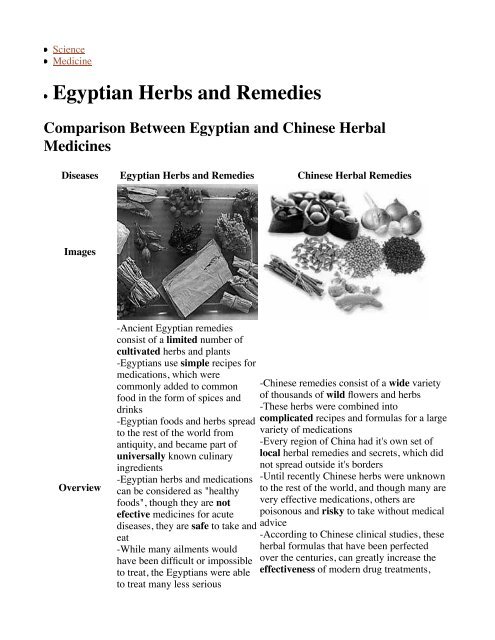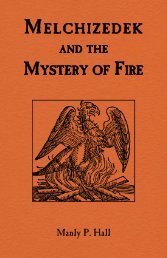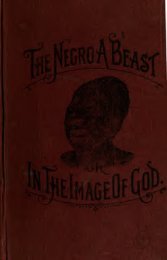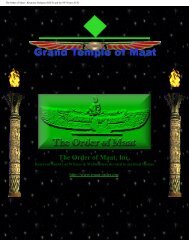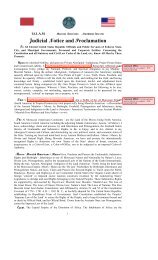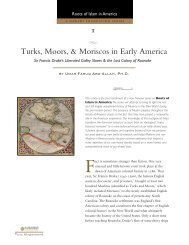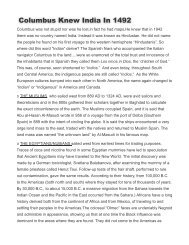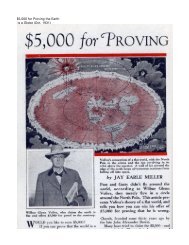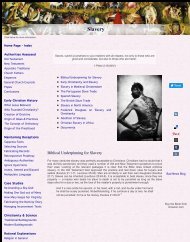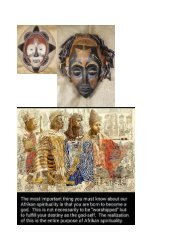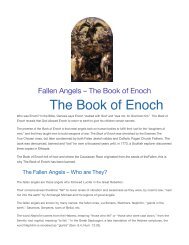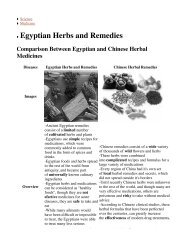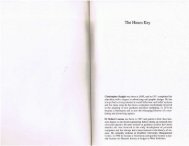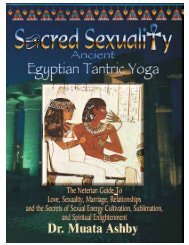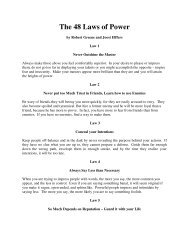KEMET Science
Create successful ePaper yourself
Turn your PDF publications into a flip-book with our unique Google optimized e-Paper software.
<strong>Science</strong><br />
Medicine<br />
Egyptian Herbs and Remedies<br />
Comparison Between Egyptian and Chinese Herbal<br />
Medicines<br />
Diseases Egyptian Herbs and Remedies Chinese Herbal Remedies<br />
Images<br />
Overview<br />
-Ancient Egyptian remedies<br />
consist of a limited number of<br />
cultivated herbs and plants<br />
-Egyptians use simple recipes for<br />
medications, which were<br />
commonly added to common -Chinese remedies consist of a wide variety<br />
food in the form of spices and of thousands of wild flowers and herbs<br />
drinks<br />
-These herbs were combined into<br />
-Egyptian foods and herbs spread complicated recipes and formulas for a large<br />
to the rest of the world from variety of medications<br />
antiquity, and became part of -Every region of China had it's own set of<br />
universally known culinary local herbal remedies and secrets, which did<br />
ingredients<br />
not spread outside it's borders<br />
-Egyptian herbs and medications -Until recently Chinese herbs were unknown<br />
can be considered as "healthy to the rest of the world, and though many are<br />
foods", though they are not very effective medications, others are<br />
efective medicines for acute poisonous and risky to take without medical<br />
diseases, they are safe to take and advice<br />
eat<br />
-According to Chinese clinical studies, these<br />
-While many ailments would herbal formulas that have been perfected<br />
have been difficult or impossible over the centuries, can greatly increase the<br />
to treat, the Egyptians were able effectiveness of modern drug treatments,<br />
to treat many less serious<br />
conditions through the use of<br />
reduce their side-effects, and sometimes
conditions through the use of<br />
natural remedies. Many of the<br />
remedies are familiar, as they are<br />
used today as homeopathic<br />
remedies.<br />
reduce their side-effects, and sometimes<br />
replace them completely.<br />
Infections<br />
Diarrhea<br />
Honey - Carvings in temples, on<br />
sarcophagi and obelisks prove<br />
that bees and honey had a vital<br />
significance in the daily life of<br />
ancient Egyptians<br />
- The Ebers Papyrus refers to the<br />
Coptis - A bitter underground stem usually<br />
medicinal value of honey. Almost<br />
combined with other bitter-tasting herbs such<br />
all Egyptian medicines contained<br />
as phellodendron, scutellaria and gardenia.<br />
honey, wine and milk<br />
- This herb was highly valued as a hard duty<br />
- Due to it's antiseptic and<br />
anti-microbial herb with a long history of use<br />
antifungal properties, honey was<br />
in traditional Chinese medicine for treating<br />
both used internally and<br />
gastrointestinal problems, gall bladder<br />
externally, to soothe irritated<br />
inflammation, abdominal cramping, and to<br />
skin, and aid in the healing of<br />
control excessive bleeding.<br />
wounds and infections,<br />
- In addition, the roots have been used in<br />
Doctors of ancient Egypt put this<br />
preparations to relieve high fevers, sore<br />
property of honey to work,<br />
throats, used externally for cankersores,<br />
treating open wounds with honey<br />
pinkeye, swollen gums, and skin eruptions.<br />
to prevent infection. This<br />
- Since coptis is such a bitter tasting herb, it<br />
treatment is described in the<br />
was often used to make pills or tablets.<br />
Edwin Smith Papyrus, and the<br />
method must have saved untold<br />
numbers of lives from deadly<br />
infections at pyramid work sites<br />
where scrapes, gashes, and cuts<br />
would have been common<br />
Acacia - The gum derived from<br />
the acacia tree was used for<br />
gastrointestinal, and urinary<br />
tracts diseases. It was often<br />
mixed with boiling water to form<br />
a mucilage, and provided a<br />
soothing coating to the digestive<br />
tract, especially in cases of<br />
gastritis and ulcers.<br />
Corainder -This herb and its<br />
seeds were commonly used by<br />
the Egyptians, coriander seeds<br />
have been found in ancient<br />
Raspberry - leaves were used<br />
interchangeably with blackberry by the<br />
Ancient Chinese to stem diarrhea.<br />
tombs, and is one of the first
Pain relief<br />
Sexual<br />
disorders<br />
Vitality<br />
tombs, and is one of the first<br />
herbs mentioned in ancient<br />
scripts. Its Egyptian name is Alangium - A species of flowering plant<br />
Kuzbarah derived from the Greek commonly used in Chinese herbalism, where<br />
"Koris"<br />
it is considered to be one of the 50<br />
- It has pain relieving properties fundamental herbs<br />
and is useful for headaches, - It was used to relieve rheumatic conditions<br />
muscle pain and stiffness, and relieve pain in the lower back and knees<br />
arthritis and rheumatism. - Also used o treat numbness and bone<br />
- Coriander essential oil was injuries, where a paste of the plant roots is<br />
known to remove toxins and applied to the area around dislocated bones to<br />
stimulate circulation. Rubbing it help them setting<br />
on the body eased muscular<br />
aches, pains and stiffness,<br />
including arthritis and<br />
inflammatory conditions<br />
- The seeds were used as a paste<br />
for mouth ulceration and a<br />
poultice for other ulcers<br />
Fenugreek - Known today in<br />
Egypt as "Helba", the plant was<br />
highly regarded by Hippocrates,<br />
and is one of the oldest medicinal<br />
herbs in ancient Egypt<br />
- It was used to ease childbirth<br />
and to increase milk flow.<br />
Mothers taking fenugreek usually<br />
notice an increase in milk flow<br />
within three days<br />
- It was used by Egyptian women<br />
to ease menstrual pain and<br />
problems. The antiviral<br />
properties of this herb have been<br />
touted for reducing mucus and<br />
relieving inflammation.<br />
- Additionally, it was used to<br />
treat male impotence<br />
Garlic - In ancient Egypt, the<br />
workers who had to build the<br />
great pyramids were fed their<br />
daily share of garlic to give them<br />
the vitality and strength to carry<br />
on and perform well<br />
Dong quai - it was used to regulate the<br />
menstrual cycle and to treat menopausal<br />
symptoms caused by the hormonal changes.<br />
- The effect of the herb in treating menstrual<br />
cramps is explained by the compounds that<br />
help relax the muscle tissue and relieves<br />
pain.<br />
- Dong Quai also stimulates the central<br />
nervous system, which can remedy menstrual<br />
weakness and headaches.<br />
- The use of this herb was mostly found in<br />
tea, herbal preparations, capsules and<br />
extracts.<br />
Ginseng - Most Chinese medicine herbs are<br />
used to strengthen the body, Ginseng which<br />
was used for well over 2000 years to help<br />
boost energy, reduce stress and increase<br />
endurance.<br />
Hibiscus - In Egypt common<br />
hibiscus is used to treat coughs<br />
by placing extracts from the plant Liquorice - used to treat coughs and colds,
Respiratory<br />
disorders<br />
Cardiovascular<br />
problems<br />
Stomach<br />
Disorders<br />
Skin diseases<br />
Eye diseases<br />
by placing extracts from the plant<br />
in the patient's bath or in water<br />
used for steam inhalations.<br />
Raw garlic was also routinely<br />
given to asthmatics and to those<br />
suffering from bronchialpulmonary<br />
complaints<br />
Onion - The Ancient Egyptians<br />
worshipped it, believing that its<br />
spherical shape and concentric<br />
rings symbolized eternal life<br />
Onions were eaten to help<br />
combat heart diseases, inhibit<br />
strokes and lower cholesterol.<br />
Caraway - the seeds of this herb<br />
were considered useful in<br />
strengthening the functions of<br />
stomach, and relieving intestinal<br />
gases<br />
Henna - Besides being used as a<br />
dye, Henna was employed both<br />
internally and locally in jaundice,<br />
leprosy, smallpox, and affections<br />
of the skin<br />
It was used to create an instant<br />
scab to close open wounds on<br />
large areas due to it's antiseptic<br />
properties, and as a cooling agent<br />
for burning of skins.<br />
Castor Oil - Beans of this plant<br />
have been found in ancient<br />
Egyptian tombs dating back to<br />
4000 BC According to the Ebers<br />
Papyrus<br />
- Egyptian doctors used castor oil<br />
to protect the eyes from irritation<br />
and dryness<br />
Liquorice - used to treat coughs and colds,<br />
since powdered liquorice root is an effective<br />
expectorant<br />
- This sweet herb was combined with a<br />
formula of other herbs and taken as a tea<br />
Motherwort - one of the Ancient Chinese<br />
herbal remedies thought to extend life.<br />
Modern studies suggest that is possible as it<br />
has been shown to strengthen heart<br />
functioning & reduce hypertension.<br />
This bitter Chinese healing herb was taken as<br />
a tea<br />
Cardamom was primarily used to alleviate<br />
stomach aches, particularly to help soothe<br />
indigestion and excess abdominal gas<br />
It was also used as an antidote for both snake<br />
and scorpion venom bite.<br />
Wolfberry - Many herbs were beneficial to<br />
the skin and are used both internally and<br />
externally for this purpose.<br />
Wolfberry leaves traditionally used to<br />
improve complexion, remove heat, remove<br />
toxins and preventing scar formation<br />
Modern studies show that indeed phenolic<br />
amides isolated from wolfberry root bark<br />
have inhibitory activity in vitro against<br />
human pathogenic bacteria and fungi<br />
The most popular Chinese formula that is<br />
considered to be herbs for eyes is the<br />
combination of Wolfberry, chrysanthemum,<br />
and rehmannia. The wolfberry herb was<br />
considered to be the primary vision tonic in<br />
Chinese herbalism and its tiny red, sweet<br />
berry shaped like an eye, its fruit is said to be<br />
rich in vitamin C and riboflavin. Modern<br />
studies show that this herb contains very high<br />
beta carotene that is known to nourish and<br />
rejuvenate the eyes.


